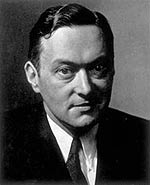
In Public Opinion (1922), Lippmann compared the masses to a “great beast” and a “bewildered herd” that needed to be guided by a governing class. He described the ruling elite as “a specialized class whose interests reach beyond the locality.” This class is composed of experts, specialists and bureaucrats. According to Lippmann, the experts, who often are referred to as “elites,” are to be a machinery of knowledge that circumvents the primary defect of democracy, the impossible ideal of the “omnicompetent citizen.” The trampling and roaring “bewildered herd” has its function: to be “the interested spectators of action,” i.e. not participants. Participation is the duty of “the responsible man”, which is not the regular citizen.
Mass media and propaganda are therefore tools that must be used by the elite to rule the public without physical coercion. One important concept presented by Lippmann is the “manufacture of consent”, which is, in short, the manipulation of public opinion to accept the elite’s agenda. It is Lippmann’s opinion that the general public is not qualified to reason and to decide on important issues. It is therefore important for the elite to decide “for its own good” and then sell those decisions to the masses.
“That the manufacture of consent is capable of great refinements no one, I think, denies. The process by which public opinions arise is certainly no less intricate than it has appeared in these pages, and the opportunities for manipulation open to anyone who understands the process are plain enough. . . . as a result of psychological research, coupled with the modern means of communication, the practice of democracy has turned a corner. A revolution is taking place, infinitely more significant than any shifting of economic power. . . . Under the impact of propaganda, not necessarily in the sinister meaning of the word alone, the old constants of our thinking have become variables. It is no longer possible, for example, to believe in the original dogma of democracy; that the knowledge needed for the management of human affairs comes up spontaneously from the human heart. Where we act on that theory we expose ourselves to self-deception, and to forms of persuasion that we cannot verify. It has been demonstrated that we cannot rely upon intuition, conscience, or the accidents of casual opinion if we are to deal with the world beyond our reach.”
–Walter Lippmann, Public Opinion
It might be interesting to note that Lippmann is one of the founding fathers of the Council on Foreign Relations (CFR), the most influential foreign policy think tank in the world. This fact should give you a small hint of the mind state of the elite concerning the usage of media.
“Political and economic power in the United States is concentrated in the hands of a “ruling elite” that controls most of U.S.-based multinational corporations, major communication media, the most influential foundations, major private universities and most public utilities. Founded in 1921, the Council of Foreign Relations is the key link between the large corporations and the federal government. It has been called a “school for statesmen” and “comes close to being an organ of what C. Wright Mills has called the Power Elite – a group of men, similar in interest and outlook shaping events from invulnerable positions behind the scenes. The creation of the United Nations was a Council project, as well as the International Monetary Fund and the World Bank.”
– Steve Jacobson, Mind Control in the United States
Some current members of the CFR include David Rockefeller, Dick Cheney, Barack Obama, Hilary Clinton, mega-church pastor Rick Warren and the CEOs of major corporations such as CBS, Nike, Coca-Cola and Visa.
Leave a comment